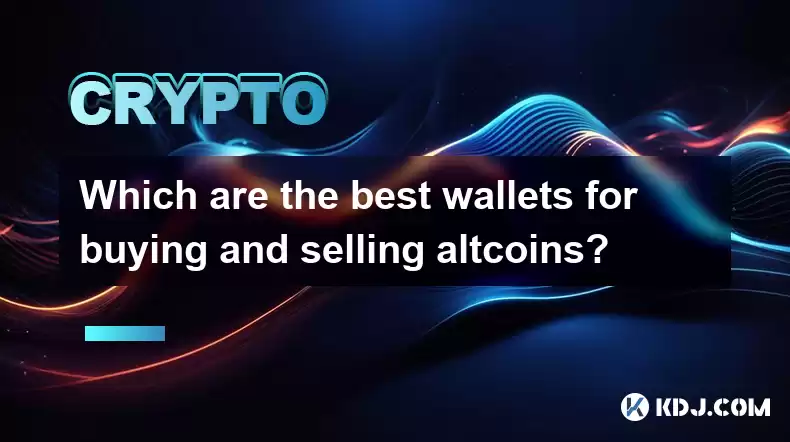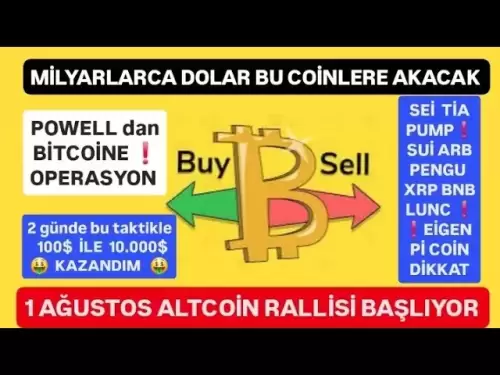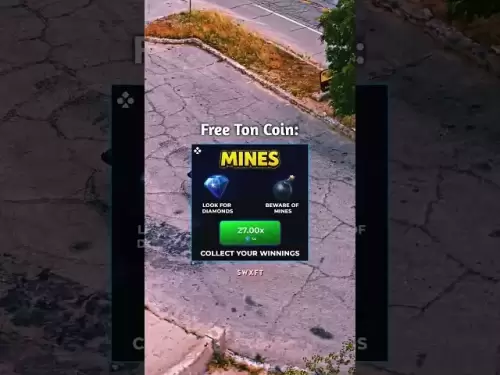-
 Bitcoin
Bitcoin $118000
-1.29% -
 Ethereum
Ethereum $3758
-3.52% -
 XRP
XRP $3.113
-5.04% -
 Tether USDt
Tether USDt $0.9998
-0.05% -
 BNB
BNB $818.5
-3.23% -
 Solana
Solana $181.9
-5.10% -
 USDC
USDC $0.9997
-0.04% -
 Dogecoin
Dogecoin $0.2239
-8.33% -
 TRON
TRON $0.3233
0.95% -
 Cardano
Cardano $0.7842
-6.81% -
 Hyperliquid
Hyperliquid $43.35
-2.12% -
 Sui
Sui $3.894
-9.97% -
 Stellar
Stellar $0.4176
-6.99% -
 Chainlink
Chainlink $17.97
-6.68% -
 Bitcoin Cash
Bitcoin Cash $576.7
-2.30% -
 Hedera
Hedera $0.2671
-7.23% -
 Avalanche
Avalanche $24.64
-6.12% -
 UNUS SED LEO
UNUS SED LEO $8.972
0.08% -
 Litecoin
Litecoin $108.1
-6.55% -
 Toncoin
Toncoin $3.198
-5.94% -
 Shiba Inu
Shiba Inu $0.00001325
-6.80% -
 Ethena USDe
Ethena USDe $1.001
-0.04% -
 Uniswap
Uniswap $10.27
-7.02% -
 Polkadot
Polkadot $3.935
-7.49% -
 Monero
Monero $317.7
-2.24% -
 Dai
Dai $0.9999
0.00% -
 Bitget Token
Bitget Token $4.550
-3.85% -
 Pepe
Pepe $0.00001179
-8.68% -
 Cronos
Cronos $0.1418
-2.34% -
 Aave
Aave $286.2
-6.49%
Which are the best wallets for buying and selling altcoins?
When selecting an altcoin wallet, consider the number of coins supported, security measures, fees, user interface, and additional features like staking capabilities.
Jan 05, 2025 at 07:56 pm

Key Points:
- Choosing a wallet that supports a wide range of altcoins
- Considering security measures for your funds
- Understanding the fees associated with each wallet
- Looking for user-friendly and intuitive interface
- Exploring additional features such as staking and cold storage
Best Wallets for Buying and Selling Altcoins
- Binance
- Pros: Supports over 500 altcoins, high liquidity, low fees, user-friendly interface
- Cons: May be susceptible to hacks, limited customer support
- Crypto.com
- Pros: Supports over 250 altcoins, low fees, MCO Visa card for rebates, high-security measures
- Cons: May have lower liquidity for smaller altcoins, potential issues with spread
- Exodus
- Pros: Supports over 100 altcoins, user-friendly interface, desktop and mobile apps, integrated exchange
- Cons: Higher fees compared to other wallets, may not support all popular altcoins
- Coinbase Wallet
- Pros: Trustworthy and secure, user-friendly interface, well-known and recognized
- Cons: Supports a limited number of altcoins (including Bitcoin and Ethereum), higher fees for on-chain transactions
- Trust Wallet
- Pros: Supports over 1 million altcoins, decentralized and non-custodial, staking rewards
- Cons: May be complex for beginners, potential security risks if private keys are compromised
- MetaMask
- Pros: Works with Ethereum and Binance Smart Chain, connects to decentralized exchanges, browser extension and mobile app
- Cons: Not a standalone wallet, requires additional hardware or software
- Ledger Nano X
- Pros: High-security hardware wallet, supports over 1,800 altcoins, Bluetooth and USB-C connectivity
- Cons: Higher cost compared to software wallets, requires setup and configuration
Factors to Consider
- Number of Altcoins Supported: Choose a wallet that supports the specific altcoins you want to trade.
- Security Measures: Look for wallets with strong security features such as 2FA, encryption, and multi-signature options.
- Fees: Consider the transaction fees associated with different wallets, especially for on-chain transactions.
- User Interface: Pick a wallet with an intuitive and easy-to-use interface that simplifies trading and managing your altcoins.
- Additional Features: Explore wallets that offer features such as staking, cold storage, trading, and integrated exchanges.
FAQs
- What are altcoins?
Altcoins are alternative cryptocurrencies other than Bitcoin. They offer diverse functionalities, including faster transaction speeds, privacy, and decentralized applications. - What are the risks of altcoins?
Altcoins can be highly volatile and risky investments. They may have less liquidity, lower adoption rates, and greater vulnerability to scams and price manipulation. - How do I protect my altcoins?
Store your altcoins in a secure hardware wallet or reputable software wallet. Use strong passwords, enable 2FA, and keep your private keys safe. - What is the best wallet for beginners?
Coinbase Wallet or Exodus are recommended for beginners due to their user-friendly interfaces and support for popular altcoins. - What is a decentralized wallet?
A decentralized wallet gives users full control over their private keys and removes the need for a central intermediary to manage funds. - What is a staking wallet?
A staking wallet allows users to earn passive income by holding certain altcoins that support the proof-of-stake consensus mechanism.
Disclaimer:info@kdj.com
The information provided is not trading advice. kdj.com does not assume any responsibility for any investments made based on the information provided in this article. Cryptocurrencies are highly volatile and it is highly recommended that you invest with caution after thorough research!
If you believe that the content used on this website infringes your copyright, please contact us immediately (info@kdj.com) and we will delete it promptly.
- Avalanche (AVAX) Price Pump Incoming? Analysts Weigh In
- 2025-07-29 06:50:12
- Presales, Investment, July 2025: What's Hot and What's Not
- 2025-07-29 06:30:12
- PayPal, Bitcoin, and Merchants: A New Era of Commerce?
- 2025-07-29 07:10:13
- RUVI Token's Ripple Rally Potential: Audited AI Crypto Heats Up!
- 2025-07-29 04:50:12
- ADA Price, Cardano, SUI & Remittix: Decoding the Latest Crypto Moves
- 2025-07-29 04:50:12
- Solana, ARK Invest, and Staking: A New Era of Institutional Crypto?
- 2025-07-29 05:30:12
Related knowledge

What is Chainlink (LINK)?
Jul 22,2025 at 02:14am
Understanding Chainlink (LINK): The Decentralized Oracle NetworkChainlink is a decentralized oracle network designed to bridge the gap between blockch...

What is Avalanche (AVAX)?
Jul 22,2025 at 08:35am
What is Avalanche (AVAX)?Avalanche (AVAX) is a decentralized, open-source blockchain platform designed to support high-performance decentralized appli...

What is Polkadot (DOT)?
Jul 19,2025 at 06:35pm
Understanding the Basics of Polkadot (DOT)Polkadot (DOT) is a multi-chain network protocol designed to enable different blockchains to transfer messag...

What is Litecoin (LTC)?
Jul 23,2025 at 11:35am
Overview of Litecoin (LTC)Litecoin (LTC) is a peer-to-peer cryptocurrency that was created in 2011 by Charlie Lee, a former Google engineer. It is oft...

What is Monero (XMR)?
Jul 21,2025 at 10:07am
What is Monero (XMR)?Monero (XMR) is a decentralized cryptocurrency designed to provide enhanced privacy and anonymity for its users. Unlike Bitcoin a...

How to add indicators to Ethereum chart on TradingView?
Jul 19,2025 at 07:15am
What Is an Ethereum Chart on TradingView?The Ethereum chart on TradingView is a visual representation of the price movement of Ethereum (ETH) over a s...

What is Chainlink (LINK)?
Jul 22,2025 at 02:14am
Understanding Chainlink (LINK): The Decentralized Oracle NetworkChainlink is a decentralized oracle network designed to bridge the gap between blockch...

What is Avalanche (AVAX)?
Jul 22,2025 at 08:35am
What is Avalanche (AVAX)?Avalanche (AVAX) is a decentralized, open-source blockchain platform designed to support high-performance decentralized appli...

What is Polkadot (DOT)?
Jul 19,2025 at 06:35pm
Understanding the Basics of Polkadot (DOT)Polkadot (DOT) is a multi-chain network protocol designed to enable different blockchains to transfer messag...

What is Litecoin (LTC)?
Jul 23,2025 at 11:35am
Overview of Litecoin (LTC)Litecoin (LTC) is a peer-to-peer cryptocurrency that was created in 2011 by Charlie Lee, a former Google engineer. It is oft...

What is Monero (XMR)?
Jul 21,2025 at 10:07am
What is Monero (XMR)?Monero (XMR) is a decentralized cryptocurrency designed to provide enhanced privacy and anonymity for its users. Unlike Bitcoin a...

How to add indicators to Ethereum chart on TradingView?
Jul 19,2025 at 07:15am
What Is an Ethereum Chart on TradingView?The Ethereum chart on TradingView is a visual representation of the price movement of Ethereum (ETH) over a s...
See all articles

























































































